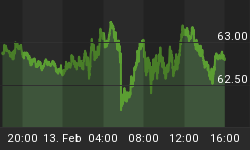Nobody wins this war of attrition, however much money they print up and shell into the market...
DURING the Second World War, Nazi Germany hatched a plot to flood Britain with fake bank notes.
Working first at the Sachsenhausen concentration camp just north of Berlin, some 140 Jewish printers and forgers made perhaps £132 million in high-quality fakes (some US$650m at the wartime exchange rate, but nearer $6bn today), equal to around 15% of Great Britain's then paper-money supply.
Named after the SS engineer who ran the operation, Operation Bernhard only saw a handful of its counterfeit fivers and tenners reach England. (The Bank of England apparently burnt what it found, along with its records.) Because, "by 1943, the Luftwaffe was almost kaput," writes historian Lawrence Malkin, and so "instead of pursuing their original goal of dropping the counterfeits on England to cast suspicion on real Pound notes, the SS used the fakes to finance its own espionage service."
The Nazis' slave-fake money thus flooded the black markets of Central Europe and North Africa, driving down the street value of Sterling (and spooking the hell out of the Bank of England, which couldn't detect those forgeries which found their way to London). Eventually, through a bizarre twist of fate (and the canny money-launderers of the Jewish underground), it helped fund the post-war flight to Palestine of Holocaust survivors.
Whereas today? Economic warfare no longer seeks to drive down the enemy's currency. In late 2010, in contrast, it's through buying your foe's money - bidding it higher - that you hurt him most.
"[Last] Friday's Wall Street Journal had an article on Japanese anger at Chinese purchases of Yen," notes Peking finance professor Michael Pettis, "which according to Japanese government data released Wednesday, showed that China's Yen purchases this year equal $27 billion, more than six times China's combined Yen buying in the previous five years."
The scoundrels! Josef Goebbels, Hitler's minister for propaganda, thought Operation Bernhard a "grotesque plan", fearing that it might rebound on the Nazis if the US or Britain replied in kind. But what would the jack-booted villain have made of today's dastardly attack on Japan by Beijing?
"Everyone is playing the same game," says Pettis - "trying to force the brunt of the adjustment abroad...and here we have China and Japan squabbling over Chinese attempts to recycle its trade surplus into Japan rather than into the US or Europe."
China buys the Yen, thus hurting Japanese exports...and so Japan buys up Dollars...which are already devalued by the US Fed's zero-rate policy, and are now pulling ahead of the Yen in the race to the bottom. Over in Europe, the Swiss National Bank sold its own Francs for Euros in the spring of this year, while the Bank of England's photon forgery team finished flooding the City of London with Pounds, creating enough money to fund an entire year of government borrowing and pushing consumer-price inflation above its own "upper tolerance" in 19 of the last 36 months with its own near-zero rates.
"The intervention is positive for the [US] Treasuries market, especially short-dated issues which Japan will likely focus on," Reuters quotes one market strategist today. Which sounds a sweet deal for the Fed's campaign to destroy Dollar savers. But nobody wins this war of attrition, however much money they print up and spend.
Rumor says Tokyo threw ¥500bn or perhaps ¥1 trillion at the Dollar on Wednesday. At that rate, it's got another 34 days to go before matching the 2003-2004 campaign, when Japan tried to defend the Dollar above ¥100. It's since slipped a further ¥17 regardless, and ¥80 has become the "line in the sand" according to currency traders.
There's money to be made here, of course, either fighting the Fed or supporting the rear-guard action in Tokyo. But in the absence of strong consumer demand at home, central-bank policy the world over is dead set on weakening the local currency - wherever you live - in a bid to win market-share in exports, no matter the cost.
Investors and savers wanting a flak jacket just pushed gold to new Dollar highs, with silver hitting its best level in almost three decades. No, they're not guaranteed to keep rising, but it's hard to see them falling too far when policy worldwide turns to actively denting the value of cash. At least no one can create precious metals at will - unlike the Yen, Dollar or Swissie - simply to shell them into the market in a war everyone loses.
















